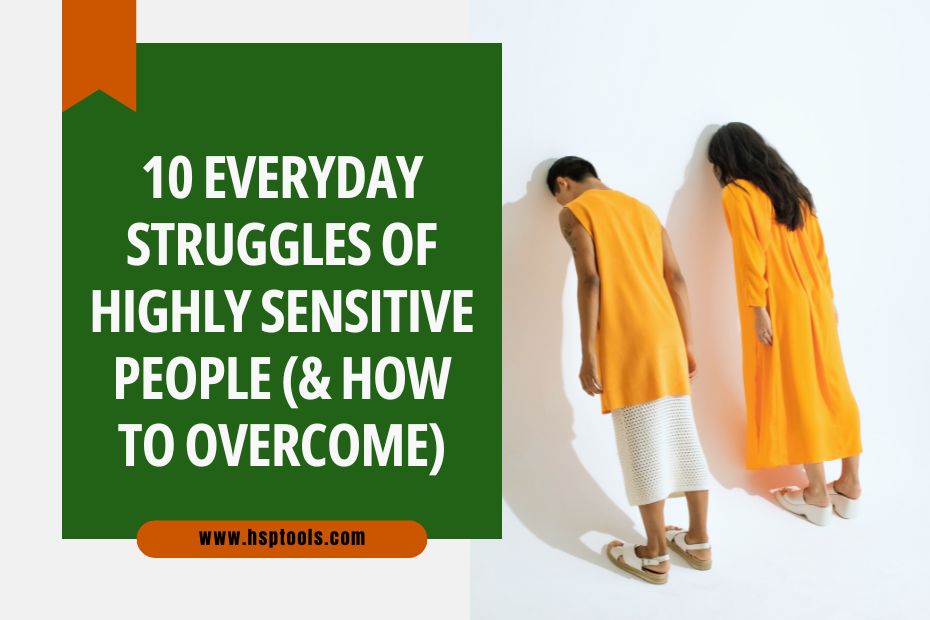10 Everyday Struggles of Highly Sensitive People (and How to Manage Them)

You know those days when the world feels a little too loud, too fast or too much, and you’re left wondering if you’re the only one who can’t just “brush it off” like everyone else seems to?
That’s often the daily reality for Highly Sensitive People (HSPs).
We feel everything more deeply, notice what others miss, and carry an inner intensity that doesn’t always match the pace of the outer world.
But this sensitivity isn’t a flaw—it’s a different operating system. And like any unique system, it comes with its challenges and strengths.
In this post, we’ll walk through 10 common HSP struggles—not so we can fix ourselves, but for understanding and care. We’ll also share compassionate, practical strategies to help you cope and create more peace.
Because you don’t have to toughen up to thrive, you only need the right tools to support your sensitive nature.

1. Sensory Overload in Loud or Busy Environments
Highly Sensitive People (HSPs) process sensory information more deeply than others, which means environments filled with bright lights, loud noises, strong smells, or chaotic crowds can quickly become overwhelming.
What might seem like background noise to someone else can feel intrusive or even painful, becoming one of the most damaging HSP struggles.
This heightened sensitivity can lead to fatigue, irritability, or a sudden urge to escape when it all becomes too much.
How to Manage Sensory Overload as an HSP
- Use noise-cancelling headphones or earplugs in overstimulating places.
- Build “quiet time” into your day after errands or social events.
- Choose calm, low-sensory environments whenever possible (think nature walks over shopping malls).
Quick Tip: Carry a small sensory kit with earplugs, a calming scent, and sunglasses for on-the-go relief.
Also Read: How to Navigate Sensory Overload as a Highly Sensitive Person (A Beginner’s Guide)
2. Feeling Emotions Deeply (Your Own and Others’)
For HSPs, emotions aren’t just passing experiences—they’re immersive. We often feel things with intensity that can be both beautiful and exhausting.
We’re also wired to be highly empathetic, which means we easily pick up on and internalize the emotions of those around us.
While this emotional depth allows for strong connections, it can also leave us drained, overwhelmed, or uncertain about where our feelings end and others’ begin.
How to Manage Feeling Other’s Emotions
- Create space for emotional processing: journaling, talking with a trusted friend, or quiet reflection.
- Practice emotional boundaries. You can care without carrying.
- Learn to name what you’re feeling. Language helps lessen the chaos.
Helpful Resource: Try mood-tracking apps or feelings wheels to build emotional awareness.
3. Struggling with Criticism
HSPs often take criticism to heart—not because we’re overly sensitive in the pejorative sense, but because we process and reflect deeply.
A single critical comment can trigger a spiral of self-doubt, shame, or perfectionism. Even well-meaning feedback may feel personal and cut deeper than intended, making it hard to bounce back or separate critique from our sense of identity.
How to Manage It
- Pause before reacting; allow your emotions to settle.
- Reframe criticism as information, not an attack on your worth.
- Seek supportive environments where feedback is kind and constructive.
Strategy to Try: Write down the criticism, highlight the helpful part, and discard the rest.
4. Feeling Misunderstood
HSPs tend to think and feel deeply, noticing subtleties others might overlook. But when you express those observations or emotions, it’s common to be met with blank stares or dismissiveness.
This might cause the HSP to feel like the odd one out—or like people don’t “get” you—leading to isolation, self-doubt, and the exhausting habit of masking your true self to fit in.
How to Manage Feeling Misunderstood
- Connect with other HSPs or sensitive souls through online communities or local meetups.
- Practice clear communication about your needs.
- Validate your experience even if others don’t “get it.”
Gentle Reminder: You don’t need to be understood by everyone to be valid.
5. Overthinking and Decision Fatigue
HSPs are wired to consider multiple angles before making choices. While this depth can be a strength, it can also cause paralysis when faced with too many options.
You might obsess over small decisions like what to wear, what to say, and whether you offended someone—draining your mental energy before the day begins.
Overthinking is one of the many HSP struggles that keep you stuck in loops that never quite resolve.
How to Manage Overthinking & Decision Fatigue
- Plan earlier to avoid spending too much time on small decisions (e.g., a weekly meal plan to avoid deciding what’s for dinner).
- Limit your choices (fewer apps, clothes, or commitments).
- Trust that you can course-correct later (not all decisions are cast in stone).
Try This: Create routines for repetitive tasks to reduce decision load.
Read: How Overthinking Affects Mental Health: A Guide for Highly Sensitive People
6. Burnout from Doing Too Much
HSPs often feel a strong sense of responsibility toward others, which can lead to chronic over-giving. Pair that with a tendency to process emotions and environments deeply, and burnout becomes a real risk.
What looks like “normal functioning” for others might leave an HSP completely depleted. Without intentional rest and recovery, we risk running on empty and resenting the people or causes we care about most.
How to Manage Burnout as an HSP
- Regularly check in with your energy, not just your schedule.
- Prioritize downtime the way you would an important meeting.
- Say “no” or “not right now” without guilt.
Energy-Saver Tip: Build in recovery time after social or sensory-heavy events.
Also Read: How to Prevent HSP Burnout: 10 Practical Tips to Get You Started
7. Difficulty Setting Boundaries
Many HSPs are natural caregivers who fear disappointing others. Saying no or asking for space can feel like a personal failure or an act of selfishness.
We often overextend ourselves to avoid conflict or maintain harmony, but that comes at the cost of our well-being. Without clear boundaries, we end up exhausted, resentful, and disconnected from our needs.
How to Manage It
- Start small: “I need a few minutes alone” is a valid boundary.
- Use “I” statements to own your needs without blaming others.
- Remember that boundaries protect relationships, not end them.
Reframe: Boundaries aren’t walls—they’re bridges to healthier connections.
Also Read: Overwhelmed by Holiday Expectations? Here’s How to Set Boundaries as an HSP
8. Guilt Over Saying No
Turning someone down—whether for a favour, an event, or extra work can stir deep feelings of guilt in HSPs.
We’re often attuned to others’ emotions and discomfort, and saying no may trigger fears of rejection, being seen as unkind, or causing disappointment.
This guilt can lead to people-pleasing habits that chip away at our time and energy.
How to Manage It
- Practice saying “no” with compassion, not apology.
- Remind yourself that honouring your limits is a kindness to everyone.
- Replace guilt with gratitude for your self-awareness.
Affirmation: “Saying no to them means saying yes to my well-being.”
9. Being Easily Affected by Others’ Moods
HSPs are like emotional barometers, often absorbing the unspoken energy in a room before anyone says a word.
While this attunement can foster empathy and intuition, it also makes us vulnerable to emotional contagion.
Someone else’s stress, anger, or sadness can quickly become our own, even unrelated to us. This can make daily life feel unpredictable or emotionally exhausting.
How to Manage It
- Visualize emotional boundaries: imagine a soft shield around your heart.
- Avoid emotional “fix-it” mode unless help is invited.
- Do a body scan and ask: “Is this feeling mine?”
Quick Reset: Step outside, breathe deeply, and reconnect with yourself.
10. Fear of Conflict or Confrontation
Conflict doesn’t just feel uncomfortable to an HSP—it can be overwhelming, disorienting, and even physically painful. Raised voices, tense body language, or abrupt feedback can trigger a fight-or-flight response.
Many HSPs go to great lengths to avoid confrontation, even if that means suppressing their needs or opinions, leading to long-term stress and unresolved resentment.
How to Manage Conflict as an HSP
- Prepare talking points before addressing tough topics.
- Stay grounded by focusing on facts, not fears.
- Practice with safe people to build confidence.
Mindset Shift: Conflict isn’t cruelty—it’s communication.
Final Thoughts on How to Handle Everyday HSP Struggles
You’re not broken. You’re not weak. You’re built to feel and perceive more, and that’s a powerful, beautiful thing.
Being a Highly Sensitive Person means you interact with life on a deeper level: emotionally, physically, and spiritually.
While this comes with challenges, it also means you bring presence, insight, and empathy into a world that often moves too fast to notice the details you naturally catch.
These everyday HSP struggles aren’t signs of failure—they’re signals. Signals that you need more rest, gentler rhythms, firmer boundaries, or deeper understanding.
The more you listen to these signals with kindness, the more you’ll discover how to thrive as your fully sensitive self.
So go gently. Pick one strategy from this guide that speaks to you today and try it out. And remember: you don’t have to do this alone.
We’re right here with you.
Looking for support?
- Join our mailing list for weekly HSP-friendly guidance.
- Download our curated list of 321 HSP resources.
- Leave a comment and share your biggest HSP struggle—we’d love to hear your story.








